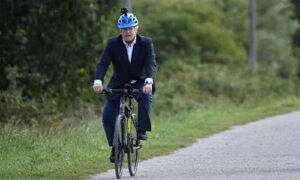Prime Minister Boris Johnson to Announce New Measures to Make Cycling Safer & Cheaper to Improve Health & Cut Virus Risk
DRs will be encouraged to prescribe cycling as a way for patients to lose weight, as part of a new government strategy to tackle the nation’s obesity crisis to be announced on Monday.
 In what Downing Street says is its biggest initiative to encourage more people to take exercise, the plans to be revealed by Prime Minister Boris Johnson.
In what Downing Street says is its biggest initiative to encourage more people to take exercise, the plans to be revealed by Prime Minister Boris Johnson.
Government officials say that a key challenge will be to make people feel safer on bikes in busy urban areas. This, they accept, will mean spending huge sums on segregated cycle lanes and secure cycle parking as well as developing low-traffic neighborhoods.
Initially the plans will be started in areas with poor health and physical activity rates, with a view to expanding them across the country if successful.
A government spokesperson said: “Covid-19 has given us all a wake-up call on the immediate and long-term risks of being overweight, and the prime minister is clear we must use this moment to get healthier, more active and eat better. We will be urging the public to use this moment to take stock of how they live their lives, and to take simple steps to lose weight, live healthier lives, and reduce pressure on the NHS.”
Johnson, who cycled to work when mayor of London and as a backbench MP, has taken a personal interest in the new strategy, particularly since he was admitted to hospital and then intensive care with coronavirus.
Sir Simon Stevens, NHS England CEO
It comes amid growing evidence that excess weight is associated with a higher risk of severe illness from coronavirus. Recent studies have also shown that cycling to work is linked to a 46% lower risk of heart disease compared with a non-active commute.
Two-thirds (63%) of UK adults are above a healthy weight, with 36% overweight and 28% obese. Alarmingly, one in three children aged 10 to 11 are overweight or obese.
Friends of Johnson say he has changed his previously “non-interventionist” views on the role the state should play in encouraging people to avoid fattening food and drink. As a result he is also expected to announce a ban on TV “junk food” advertisements before 9 pm and possibly a ban on online promotions for unhealthy foods, and limits on in-store promotions.
Speaking during a recent visit to a GP surgery in east London, Johnson said that he did not normally support “nannying or bossying”, but added: “Obesity is one of the real co-morbidity factors. Losing weight, frankly, is one of the ways you can reduce your own risk from coronavirus.”
In a further move to tackle expanding waistlines, people in England who are at risk of diabetes or already have the disease will from Monday be able to seek help without seeing their Dr. They will be able to refer themselves to NHS England’s acclaimed Healthier You diabetes prevention program, which helps patients lose weight and adopt healthier lifestyles.
Until now people have had to visit their Dr. or nurse and have a blood test before being referred. NHS England’s decision to let people self-refer comes after the sharp fall in the number of patients visiting a Dr. during the pandemic.
In future people will be able to use an online tool, hosted by Diabetes UK, to calculate their risk of developing diabetes. Anyone recording a moderate or high score can then refer themselves to their local branch of Healthier You, which provides weight and lifestyles coaches, online support groups and in some places wearable technology to monitor their health.
More than 500,000 people have already been referred to the program, which lasts for nine to 12 months. People who have completed it have lost an average of 3.6kg, NHS England says. Around 4.8 million Britons have been diagnosed with, or are thought to have, diabetes, which costs the NHS an estimated £10bn a year. Nine in ten of them have Type 2 Diabetes, which is closely associated with being overweight.
“The evidence is now in: obesity can double your chance of dying from coronavirus. So this pandemic is a call to arms to adopt medically proven changes in what we eat and how we exercise”, said Sir Simon Stevens, NHS England’s chief executive.
Thanks to The Guardian for this Article






Leave A Comment